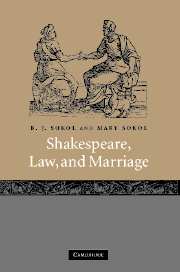Book contents
- Frontmatter
- Contents
- Acknowledgments
- List of abbreviations: Shakespeare titles
- Introduction
- 1 Making a valid marriage: the consensual model
- 2 Arranging marriages
- 3 Wardship and marriages enforced by law
- 4 Financing a marriage: provision of dowries or marriage portions
- 5 The solemnisation of marriage
- 6 Clandestine marriage, elopement, abduction, and rape: irregular marriage formation
- 7 The effects of marriage on legal status
- 8 Marriage breakdown: separation, divorce, illegitimacy
- 9 'Til death us do part
- An afterword on method
- Notes
- Bibliography
- Index
4 - Financing a marriage: provision of dowries or marriage portions
Published online by Cambridge University Press: 22 September 2009
- Frontmatter
- Contents
- Acknowledgments
- List of abbreviations: Shakespeare titles
- Introduction
- 1 Making a valid marriage: the consensual model
- 2 Arranging marriages
- 3 Wardship and marriages enforced by law
- 4 Financing a marriage: provision of dowries or marriage portions
- 5 The solemnisation of marriage
- 6 Clandestine marriage, elopement, abduction, and rape: irregular marriage formation
- 7 The effects of marriage on legal status
- 8 Marriage breakdown: separation, divorce, illegitimacy
- 9 'Til death us do part
- An afterword on method
- Notes
- Bibliography
- Index
Summary
New plays and maidenheads are near akin:
Much followed both, for both much money giv'n
(TNK, Prologue, 1–2)OVERVIEW
The family could become involved in a child's marriage in two ways, either by promoting the choice of a particular marriage partner, or by supplying material support. Unfortunately for the coherence of the subject, these two aspects of family involvement cannot be kept entirely distinct. In chapter 2 we have seen that the degree of involvement of families in the selection of a marriage partner ranged between the extremes of benign acceptance and a blessing of a child's own choice, and forcible coercion to accept a parent's choice of spouse. But when families gave property to newly marrying couples, their interest may not have been limited to the pecuniary. Since family material support could be withheld as well as offered, it could be used in coercive ways. Alternatively, support could be withheld, protectively, where a prospective marriage caused the family genuine concern for the interests of their offspring. For such reasons, financial arrangements for marriages will not divide on such simple lines as the laudable versus the detestable aspects of family involvement.
The present chapter will focus mainly on the provision of the dowries or marriage portions which brides typically brought into their marriages. The details of these portions were usually negotiated before marriage between the bride's and the groom's families, and once agreed marriage settlements specifying the conditions and the amounts of dowries were often fixed by common law contracts.
- Type
- Chapter
- Information
- Shakespeare, Law, and Marriage , pp. 56 - 72Publisher: Cambridge University PressPrint publication year: 2003

